初中英语近义词辨析
初中中考英语100组近义词辨析

初中英语近义词辨析1. clothes, cloth, clothingclothes统指各种衣服,谓语动词永远是复数,cloth指布,为不可数名词clothing 服装的总称,指一件衣服用a piece of, an article of.2. family, house, homehome 家,包括住处和家人,house房子,住宅,family家庭成员. My family is a happy one.3. sound, voice, noisesound自然界各种各样的声音,voice人的嗓音,noise噪音I hate the loud noise outside.4. photo, picture, drawingphoto用照相机拍摄的照片,picture可指相片,图片,电影片,drawing画的画。
5. population, peoplepopulation人口,人数,people具体的人China has a large population.6. road, street, path, wayroad具体的公路,马路,street街道,path小路,小径,way道路,途径take this road; in the street, show me the way to the museum.7. custom, habitcustom传统风俗,习俗,也可指生活习惯,后接to do,habit生活习惯,习惯成自然,后接of doing. I've got the habit of drinking a lot.8. exercise, exercises, practiceexercise运动,锻炼(不可数),exercises练习(可数),practice(反复做的)练习Practice makes perfect.9. class, lesson作"课"解时,两者可以替换.指课文用lesson. 指班级或全体学生用class. Lesson 6; class 5.10. officer, officialofficer部队的军官,official政府官员an army officer.11. work, job二者均指工作。
初中英语 近义词辨析
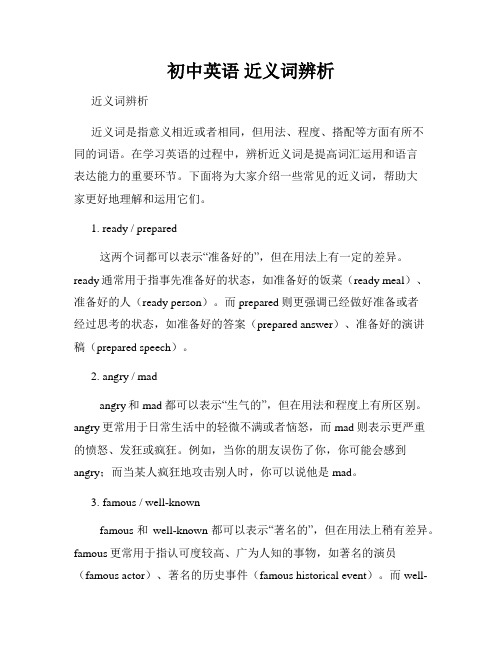
初中英语近义词辨析近义词辨析近义词是指意义相近或者相同,但用法、程度、搭配等方面有所不同的词语。
在学习英语的过程中,辨析近义词是提高词汇运用和语言表达能力的重要环节。
下面将为大家介绍一些常见的近义词,帮助大家更好地理解和运用它们。
1. ready / prepared这两个词都可以表示“准备好的”,但在用法上有一定的差异。
ready通常用于指事先准备好的状态,如准备好的饭菜(ready meal)、准备好的人(ready person)。
而prepared则更强调已经做好准备或者经过思考的状态,如准备好的答案(prepared answer)、准备好的演讲稿(prepared speech)。
2. angry / madangry和mad都可以表示“生气的”,但在用法和程度上有所区别。
angry更常用于日常生活中的轻微不满或者恼怒,而mad则表示更严重的愤怒、发狂或疯狂。
例如,当你的朋友误伤了你,你可能会感到angry;而当某人疯狂地攻击别人时,你可以说他是mad。
3. famous / well-knownfamous和well-known都可以表示“著名的”,但在用法上稍有差异。
famous更常用于指认可度较高、广为人知的事物,如著名的演员(famous actor)、著名的历史事件(famous historical event)。
而well-known则更侧重于广为人知、众所周知的事物,如众所周知的事实(well-known fact)、众所周知的地方(well-known place)。
4. continue / keepcontinue和keep都可以表示“继续”,但在用法上有所区别。
continue常用于指在某种情况下继续进行某个动作,如继续学习(continue studying)、继续工作(continue working)。
而keep则表示保持某种状态或持续进行某个动作,如保持安静(keep quiet)、持续成长(keep growing)。
英语常考近义词成语辨析100组

英语常考近义词成语辨析100组1. 喜欢 vs. 爱好 - 指对某一事物或活动的有好感或偏爱。
2. 开心 vs. 快乐 - 表示愉快的心情。
3. 困惑 vs. 迷惑 - 表示对某事情感到疑惑或莫名其妙。
4. 同情 vs. 同情心 - 表示对他人的困难或苦难感到理解和关切。
5. 感激 vs. 感谢 - 表示对别人的帮助或恩惠表示谢意。
6. 独特 vs. 特殊 - 表示与众不同或与常规不同。
7. 敏捷 vs. 灵活 - 表示动作或思维的迅捷程度。
8. 忠诚 vs. 诚实 - 表示对某人或某事的忠心和坦诚。
9. 本领 vs. 能力 - 表示某种技能或才能。
10. 合理 vs. 公正 - 表示合乎逻辑或公平正义。
11. 危险 vs. 风险 - 表示存在威胁或可能带来危险的情况。
12. 政府 vs. 政权 - 表示治理国家的机构或组织。
13. 友谊 vs. 友情 - 表示朋友之间的情感和关系。
14. 丰富 vs. 富裕 - 表示财富或资源充足。
15. 智慧 vs. 聪明 - 表示智力水平较高或思维敏捷。
16. 关注 vs. 关心 - 表示对某事物或某人的关注和关心。
17. 反对 vs. 抵制 - 表示不支持或反抗某一事物或行为。
18. 容易 vs. 简单 - 表示易于做到或理解。
19. 紧张 vs. 担忧 - 表示焦虑或担忧的情绪。
20. 信任 vs. 依赖 - 表示对某人或某事物的信心或依赖。
21. 目标 vs. 任务 - 表示需要完成的工作或目标。
22. 利益 vs. 好处 - 表示从某事物中获得的利益或好处。
23. 减少 vs. 缩小 - 表示数量或规模的减少。
24. 批评 vs. 指责 - 表示对某人或某事物的不满或责备。
25. 传统 vs. 习俗 - 表示某一群体传承下来的风俗或习惯。
26. 科学 vs. 学问 - 表示知识体系或某一学科的研究。
27. 知识 vs. 智慧 - 表示学习和了解的内容和能力。
初中英语同义词辨析知识点梳理
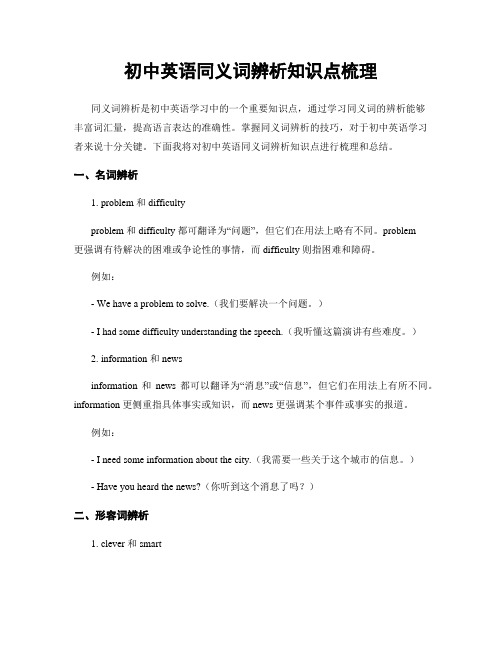
初中英语同义词辨析知识点梳理同义词辨析是初中英语学习中的一个重要知识点,通过学习同义词的辨析能够丰富词汇量,提高语言表达的准确性。
掌握同义词辨析的技巧,对于初中英语学习者来说十分关键。
下面我将对初中英语同义词辨析知识点进行梳理和总结。
一、名词辨析1. problem 和 difficultyproblem 和 difficulty 都可翻译为“问题”,但它们在用法上略有不同。
problem更强调有待解决的困难或争论性的事情,而 difficulty 则指困难和障碍。
例如:- We have a problem to solve.(我们要解决一个问题。
)- I had some difficulty understanding the speech.(我听懂这篇演讲有些难度。
)2. information 和 newsinformation 和news 都可以翻译为“消息”或“信息”,但它们在用法上有所不同。
information 更侧重指具体事实或知识,而 news 更强调某个事件或事实的报道。
例如:- I need some information about the city.(我需要一些关于这个城市的信息。
)- Have you heard the news?(你听到这个消息了吗?)二、形容词辨析1. clever 和 smartclever 和smart 都可以翻译为“聪明”的意思,但它们在用法和意义上有所差别。
clever 强调智力明晰,能够快速理解和解决问题,而 smart 则更侧重于外表和衣着得体。
例如:- He is a clever student who always gets good grades.(他是个聪明的学生,总是取得好成绩。
)- The boy looks smart in his new suit.(这个男孩穿上新衣服看起来很帅气。
)2. interesting 和 excitinginteresting 和 exciting 都可以翻译为“有趣”的意思,但它们在用法上有所区别。
初中英语近义词辨析中考复习

初中英语近义词辨析中考复习1.clothes, cloth,clothingclothes统指各种衣服,谓语动词永远是复数,cloth指布,为不可数名词clothing 服装的总称,指一件衣服用a piece of, an article of2.f amily,house,homehome 家,包括住处和家人,house房子,住宅,family家庭成员。
My family is a happy one.3.s ound,voice, noisesound自然界各种各样的声音,voice人的嗓音,noise噪音I hate the loud noise outside.4.p hoto,picture, drawingphoto用照相机拍摄的照片,picture可指相片,图片,电影片,drawing画的画。
5.p opulation,peoplepopulation人口,人数,people具体的人China has a large population。
6.r oad, street, path,wayroad具体的公路,马路,street街道,path 小路,小径,way道路,途径take this road; in the street,show me the way to the museum.7.c ustom, habitcustom传统风俗,习俗,也可指生活习惯,后接to do, habit生活习惯,习惯成自然,后接of doing。
I’ve got the habit of drinking a lot.8.e xercise,exercises,practice exercise运动,锻炼(不可数),exercises 练习(可数),practice(反复做的)练习Practice makes perfect。
9.c lass,lesson作”课”解时,两者可以替换。
指课文用lesson. 指班级或全体学生用class。
九年级英语近义词辨析(全)
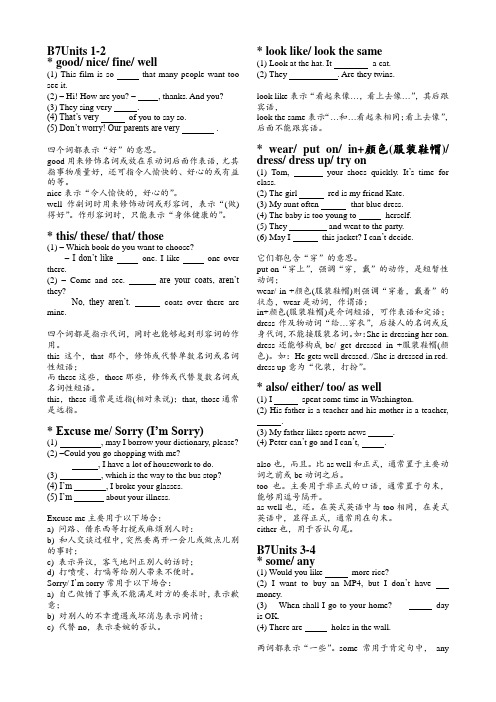
B7Units 1-2* good/ nice/ fine/ well(1) This film is so that many people want too see it.(2) – Hi! How are you? –, thanks. And you?(3) They sing very .(4) That’s very of you to say so.(5) Don’t worry! Our parents are very .四个词都表示“好”的意思。
good用来修饰名词或放在系动词后面作表语,尤其指事物质量好,还可指令人愉快的、好心的或有益的等。
nice表示“令人愉快的,好心的”。
well作副词时用来修饰动词或形容词,表示“(做)得好”。
作形容词时,只能表示“身体健康的”。
* this/ these/ that/ those(1) – Which book do you want to choose?–I don’t like one. I like one over there.(2) –Come and see. are your coats, aren’t they?- No, they aren’t. coats over there are mine.四个词都是指示代词,同时也能够起到形容词的作用。
this这个,that那个,修饰或代替单数名词或名词性短语;而these这些,those那些,修饰或代替复数名词或名词性短语。
this,these通常是近指(相对来说);that, those通常是远指。
* Excuse me/ Sorry (I’m Sorry)(1) , may I borrow your dictionary, please?(2) –Could you go shopping with me?-, I have a lot of housework to do.(3) , which is the way to the bus stop?(4) I’m , I broke your glasses.(5) I’m about your illness.Excuse me主要用于以下场合:a) 问路、借东西等打搅或麻烦别人时:b) 和人交谈过程中,突然要离开一会儿或做点儿别的事时;c) 表示异议,客气地纠正别人的话时;d) 打喷嚏、打嗝等给别人带来不便时。
初中英语近义词辨析大全共80页(超全)

初中英语近义词辨析大全1 a bit/ a little这两个词都意为“一点儿”有时可以互换,但有时不能。
Ⅰ.二者作程度副词修饰形容词、副词、动词或比较级时,意义相同,为“一点儿”“有些”。
如:①I am a bit / a little hungry. 我有点饿。
②He walked a bit / a little slowly. 他走路有点慢。
Ⅱ.二者都可以作名词词组,充当主语或宾语。
如:① A little / bit is enough for me. 我有一点儿就够了。
②I know only a little / a bit about her. 我对她的情况只了解一点。
Ⅲ。
a little可直接修饰名词;a bit后须加of才可以。
如:①.There is a little water in the bottle. = There is a bit of water in the bottle.[注意]a little of后的名词通常特指,表“……中的一些”,如:①May I have a little of your tea?Ⅳ. 否定形式not a little 作状语,相当于very/ quite, “很”,“非常”;作定语和宾语时,相当于much, 意为“许多”。
而not a bit 作状语时,相当于not at all, 意为“一点也不”,作宾语时则相当于not much. Eg:①He is not a little (=very) hungry. 他饿极了。
②He is not a bit (=not at all) hungry.他一点也不饿。
③She ate not a little (=much). 她吃得很多。
Ⅴ. Not a bit中的not 可以分开使用;not a littl e中的not 则不能分开。
Eg:①He felt not a bit tired. = He didn’t feel a bit tired. 他觉得一点也不累。
初中英语同义词辨析
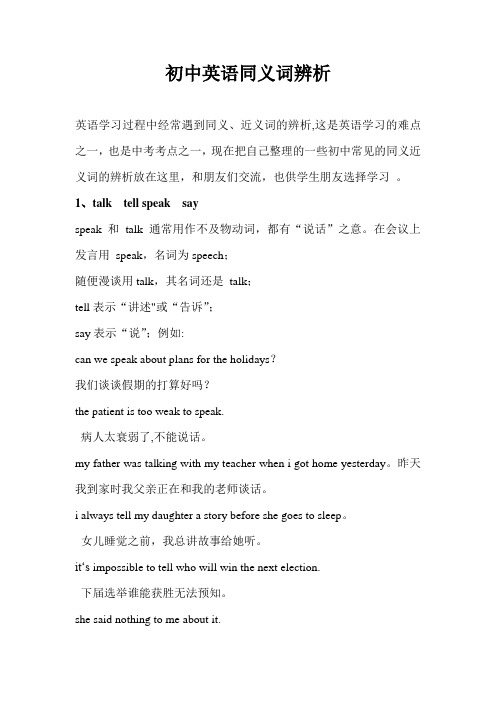
初中英语同义词辨析英语学习过程中经常遇到同义、近义词的辨析,这是英语学习的难点之一,也是中考考点之一,现在把自己整理的一些初中常见的同义近义词的辨析放在这里,和朋友们交流,也供学生朋友选择学习。
1、talk tell speak sayspeak 和talk 通常用作不及物动词,都有“说话”之意。
在会议上发言用speak,名词为speech;随便漫谈用talk,其名词还是talk;tell表示“讲述"或“告诉”;say表示“说”;例如:can we speak about plans for the holidays?我们谈谈假期的打算好吗?the patient is too weak to speak.病人太衰弱了,不能说话。
my father was talking with my teacher when i got home yesterday。
昨天我到家时我父亲正在和我的老师谈话。
i always tell my daughter a story before she goes to sleep。
女儿睡觉之前,我总讲故事给她听。
it‘s impossible to tell who will win the next election.下届选举谁能获胜无法预知。
she said nothing to me about it.关于这一点,她什么也没有对我讲.*speak 当及物动词用时,宾语一般是语言或词语之类的词。
如: does anyone speak english here?这儿有人会说英语吗?2、good well nicegood 形容词,好的,合适的,新鲜的,擅长的。
well 作形容词时,指"(身体)健康的”;还可用作副词,修饰动词。
nice形容词,美好的,令人愉快的,可爱的,特指取悦感官的事物。
she is good at english。
她擅长英语。
初中英语同义词辨析
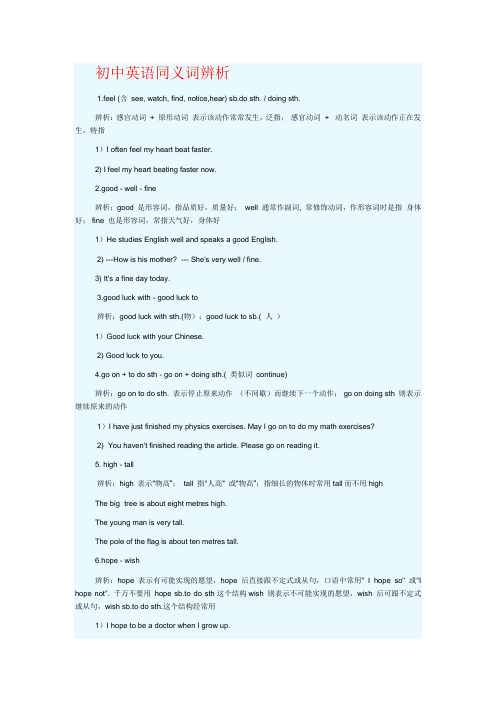
初中英语同义词辨析1.feel (含see, watch, find, notice,hear) sb.do sth. / doing sth.辨析:感官动词+ 原形动词表示该动作常常发生,泛指;感官动词+ 动名词表示该动作正在发生,特指1)I often feel my heart beat faster.2) I feel my heart beating faster now.2.good - well - fine辨析:good 是形容词,指品质好,质量好;well 通常作副词, 常修饰动词,作形容词时是指身体好; fine 也是形容词,常指天气好,身体好1)He studies English well and speaks a good English.2) ---How is his mother? --- She's very well / fine.3) It's a fine day today.3.good luck with - good luck to辨析:good luck with sth.(物);good luck to sb.( 人)1)Good luck with your Chinese.2) Good luck to you.4.go on + to do sth - go on + doing sth.( 类似词continue)辨析:go on to do sth. 表示停止原来动作(不间歇)而继续下一个动作; go on doing sth 则表示继续原来的动作1)I have just finished my physics exercises. May I go on to do my math exercises?2) You haven't finished reading the article. Please go on reading it.5. high - tall辨析:high 表示“物高”;tall 指"人高“ 或“物高”;指细长的物体时常用tall而不用highThe big tree is about eight metres high.The young man is very tall.The pole of the flag is about ten metres tall.6.hope - wish辨析:hope 表示有可能实现的愿望,hope 后直接跟不定式或从句,口语中常用" I hope so" 或"I hope not". 千万不要用hope sb.to do sth这个结构wish 则表示不可能实现的愿望,wish 后可跟不定式或从句,wish sb.to do sth.这个结构经常用1)I hope to be a doctor when I grow up.2) We hope that we all can pass the exam.3)-- Do you want to go with us? --- I hope so.4) He wishes he could fly to the moon some day.5) The teacher wished us to hand in our exercise-books in time.6.have to - must辨析:have to 表示客观需求,“必须”“一定”“不得不”,而must则表示主观愿望1)I had to stay at home to look after my mother because she is ill yesterday.2)He doesn't have to say so .3)You must learn English well.7. hanged - hung辨析:hanged 表示“绞死”“吊死”,hung 表示“悬挂”“吊起来”1)You will be hanged as a spy tommorrow.2) My wet clothes are hung on the line .8. have been - have gone辨析:have been表示“去过某地”,而have gone 则表示“到某地去了”,现不在这里1)I have been to Beijing twice already.2) My head teacher has gone to Nanjing.3) ---- Where is your father? --- He has gone to work.9. hear - listen - listen to辨析:hear 表示“听”的结果,listen to 表示“听”的动作,而listen 则是呼唤词,通常放到句首1)I listened to the teacher , but I heard nothing clearly.2) Please listen to her carefully.3) Listen! Who is crying?10.have/ have got(1)在英语口语中,常用have got 代替have ,作“有”解。
中考英语43组高频近义词辨析详解

中考英语43组高频近义词辨析详解1、近义词辨析:accept 和receiv eaccept 是“接受、认可“的意思,是收到并接受;receive 有”收到“的意思,但不一定接受。
e.g. I received a lot of gifts on my birthday, but I didn’t accept any.生日那天我收到许多礼物,但是我并没有收下任何礼物。
2、近义词辨析:ago 和beforeago: 应注意两点:1.用于一般过去时;2. 它所指的时间是从现在算起。
before: 也应该注意两点:1.用于过去完成时;2. 她所指的时间不是从现在算起,而是从过去某一时刻算起。
e.g. A short time before, tall trees had covered the country for many miles around. 在那时不久之前,高大的树木覆盖着方圆数英里。
3近义词辨析:agree to 和agree withagree to: 意思是“同意”,后面接表示计划、安排、意见、条件之类的名词或动词原形,表示愿意协助工作。
e.g. Do you agree to this agreement? 你同意这项协议吗?He didn’t agree to help us. 他不同意帮助我们。
agree with: 意思是“与……(意见)一致”后面一般接人,也可接意见、看法等。
但不含有协助的意思。
e.g. I don’t agree with what you sai d. 我不同意你说的话。
I don’t agree with your idea. 我不同意你的主意。
alone 指“独自一人胡”,强调客观事实,通常只放在动词、系动词之后,作表语。
e.g. He was alone in the room. 他独自一人在屋里。
lonely 指“孤单的”、“孤独的”,表示主观感觉,在句中作表语或定语。
初中英语183个同义词辨析详细解析
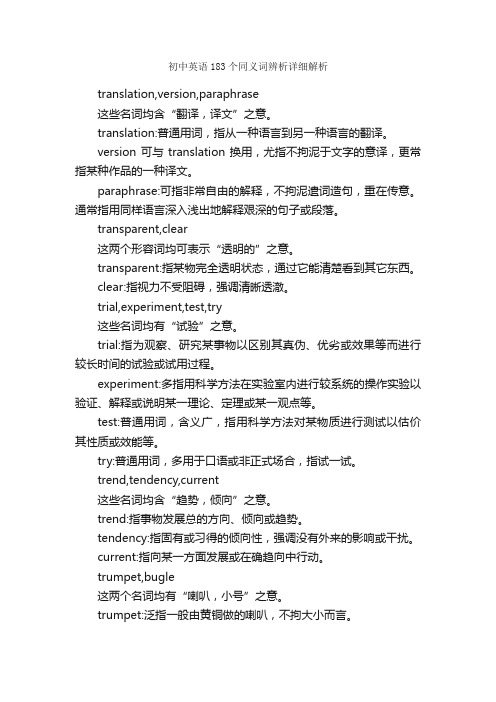
初中英语183个同义词辨析详细解析translation,version,paraphrase这些名词均含“翻译,译文”之意。
translation:普通用词,指从一种语言到另一种语言的翻译。
version可与translation换用,尤指不拘泥于文字的意译,更常指某种作品的一种译文。
paraphrase:可指非常自由的解释,不拘泥遣词造句,重在传意。
通常指用同样语言深入浅出地解释艰深的句子或段落。
transparent,clear这两个形容词均可表示“透明的”之意。
transparent:指某物完全透明状态,通过它能清楚看到其它东西。
clear:指视力不受阻碍,强调清晰透澈。
trial,experiment,test,try这些名词均有“试验”之意。
trial:指为观察、研究某事物以区别其真伪、优劣或效果等而进行较长时间的试验或试用过程。
experiment:多指用科学方法在实验室内进行较系统的操作实验以验证、解释或说明某一理论、定理或某一观点等。
test:普通用词,含义广,指用科学方法对某物质进行测试以估价其性质或效能等。
try:普通用词,多用于口语或非正式场合,指试一试。
trend,tendency,current这些名词均含“趋势,倾向”之意。
trend:指事物发展总的方向、倾向或趋势。
tendency:指固有或习得的倾向性,强调没有外来的影响或干扰。
current:指向某一方面发展或在确趋向中行动。
trumpet,bugle这两个名词均有“喇叭,小号”之意。
trumpet:泛指一般由黄铜做的喇叭,不拘大小而言。
bugle:一般指军队中吹信号用的小喇叭。
turbulent,stormy,violent,wild,fierce这些形容词均含“剧烈的,凶猛的,狂暴的”之意。
turbulent:正式用词,多用描写风和水,也可指心神不定或控制不住的感情波动。
stormy:指风雨大作,也指人很激动的感情。
初中英语近义词辨析中考复习

初中英语近义词辨析中考复习1.clothes,cloth,clothingclothes统指各种衣服,谓语动词永远是复数,cloth指布,为不可数名词clothing 服装的总称,指一件衣服用a piece of,an article of2.f amily, house, homehome 家,包括住处和家人,house房子,住宅,family家庭成员. My family is a happy one。
3.s ound,voice,noisesound自然界各种各样的声音,voice人的嗓音,noise噪音I hate the loud noise outside。
4.p hoto,picture,drawingphoto用照相机拍摄的照片,picture可指相片,图片,电影片,drawing画的画。
5.p opulation,peoplepopulation人口,人数,people具体的人China has a large population。
6.r oad,street, path,wayroad具体的公路,马路,street街道,path 小路,小径,way道路,途径take this road;in the street, show me the way to the museum.7.c ustom,habitcustom传统风俗,习俗,也可指生活习惯,后接to do, habit生活习惯,习惯成自然,后接of doing. I've got the habit of drinking a lot。
8.e xercise, exercises,practice exercise运动,锻炼(不可数),exercises 练习(可数),practice(反复做的)练习Practice makes perfect。
9.c lass,lesson作”课"解时,两者可以替换。
初中三年英语必备同义词辨析(附超详细讲解例句)

初中三年英语必备同义词辨析(附超详细讲解例句)中考常考同义词辨析1.say, speak, talk, tell这四个词都有“说”的意思,其用法差异主要在于各自强调的对象、内容不同。
(1) say的意思是“说”、“讲”、“说出”,是及物动词,强调“说”的内容。
不仅可指口头“说”,而且可指书面“说”。
eg: ① He said nothing to me. 他对我什么也没说。
② He said in his letter that he was getting on well with his life.他在信中说,他生活得很好。
(2) speak表“说”、“讲”,它可以表示任何一种方式的“说话”。
它着重“说话”这一动作本身,而不强调所“说”的内容。
它通常为不及物动词,但它也可以作及物动词,后接the language、the truth、aword等,或接表示语言名称的名词。
eg: ①Please speak more slowly and clearly. 请说慢些和清楚些。
②Who is speaking? 你是谁?(打电话时用语)③Can you speak Japanese? 你会讲日语吗?(3) talk表示“交谈”、“谈话”,它指连贯地与人交谈,着重指说话的动作,而不强调说话的内容。
它一般用作不及物动词。
eg: ①What are you talking about? 你们在谈论什么?②We are talking about the Chinese footballmatch.我们在谈论中国足球比赛。
(4) tell表“告诉”、“讲述”之意,是及物动词,常强调所讲的内容,不表示动作。
重点句式:tell sb. sth = tell sth to sb. 告诉某人某事eg: He told me nothing. = He toldnothing to me.他什么也没告诉我。
tell sb. (not) to do sth. 告诉某人(不)去做某事eg: He told us not to worry abouthim.他告诉我们不要为他担心。
常见英文近义词辨析100组

常见英文近义词辨析100组1. accept vs. receiveAccept 暗示自愿接受,通常涉及主动选择。
Receive 则表示被动接受,无需选择或同意。
2. accessible vs. approachableAccessible 指容易获得或接近。
Approachable 指容易相处或交谈。
3. accomplish vs. achieveAccomplish 强调完成特定的任务或目标。
Achieve 则更广泛,表示达到一个更重大的目标或状态。
4. accurate vs. preciseAccurate 指信息准确无误,与事实一致。
Precise 指信息非常详细、精确,没有模糊或不确定性。
5. activity vs. actionActivity 指一般性的、持续的行动。
Action 指具体的、一次性的行为。
6. advice vs. counselAdvice 指针对特定情况或问题的建议。
Counsel 通常指更全面、更深入的指导和建议。
7. affect vs. effectAffect 作为动词,表示影响或改变。
Effect 作为名词,表示结果或后果。
8. agree vs. concurAgree 指双方就某件事达成一致意见。
Concur 表示同意或支持他人的意见或决定。
9. almost vs. nearlyAlmost 表示非常接近,但没有完全达到。
Nearly 也表示非常接近,但通常比 almost 更明确。
10. amazing vs. astonishingAmazing 表示令人印象深刻或惊奇。
Astonishing 表示令人震惊或难以置信。
11. appear vs. seemAppear 指表面上或明显的样子。
Seem 指主观印象或感觉。
12. appreciate vs. admireAppreciate 指对某事或某人的价值或品质表示赞赏。
Admire 指对某事或某人持有高度的尊敬或钦佩。
初中英语近义词、同义词、词组、短语辨析大全

初中英语近义词、同义词、词组、短语辨析大全1. look for, find, find out﹡ look for 是“动词 + 介词”结构,意为“寻找”,表示正在进行的动作;﹡ find 意为“找到,发现”,多指偶然性的,表示look for 之后的结果;﹡ find out 是“动词 + 副词”结构,意为“找出查,明”,指通过观察而发现事实的真相,调查后找出原因等。
同时要注意课文中出现的find句型:find sb. / sth. doing sth. 发现某人(某物)在做某事;find it hard / difficult to do sth. 发现做某事是难的。
例如:What are you looking for? 你在找什么?They found the lost child hiding in the cave.他们发现走失了的孩子藏在山洞里。
Did you find out why he was late? 他迟到的原因你查清了吗?★............................................★............................................★2.worth 的用法worth,worthy,worth-while都为adj.意为"值得"。
1. worth: be worth + n.当名词为金钱时,表示"……值得……"be worth doing sth."……某事值得被做"The question is not worth discussing again and again.2. worthy:be worthy of +n.当名词为抽象名词时表示"……值得……"be worthy to be done "某事值得被做"The question is not worthy to be discussed againand again.3. worth-while: be worth-while to do sth "值得做某事"worth while: It is worth while doing sthIt is worth while sb to do sth. .............................................................................典型例题It is not ____ to discuss the question again and again.A.worthB.worthyC.worth-whileD.worth while答案C. 由worth的用法可知,此句只适合词组be worth-while to do sth.。
初中英语知识归纳近义词的用法和区别

初中英语知识归纳近义词的用法和区别近义词是指在词义上或者语法用法上有一定相似度的词语。
在学习英语时,了解近义词的用法和区别对于提高语言表达的准确性和丰富性非常重要。
本文将对初中英语知识中常见的近义词进行归纳总结,并详细探讨它们的用法和区别。
1. ask / inquire"ask" 和 "inquire" 都表示“询问”的意思,但在用法上略有区别。
"ask" 是常用词,可以用于正式和非正式场合,一般用于对他人提出问题或请求信息。
例如:- She asked me about my favorite movie.(她问起我最喜欢的电影。
)- Can I ask you a question?(我可以问你个问题吗?)"inquire" 则更加正式和严肃,一般用于正式或商务场合。
例如:- He inquired about the price of the car.(他询问了一下汽车的价格。
)- The police are inquiring into the matter.(警方正在调查这件事。
)总结:"ask" 是更常用的词,适用于各种场合;"inquire" 则更正式,适用于商务或正式场合。
2. buy / purchase"buy" 和 "purchase" 都表示“购买”的意思,可以互相替换使用。
但从程度上来说,"purchase" 更正式,常用于商务或正式文书中。
例如:- She bought a new dress at the mall.(她在商场买了一条新裙子。
)- We purchased some office supplies for the company.(我们为公司购买了一些办公用品。
)总结:"buy" 更常用,可以适用于日常口语和非正式场合;"purchase" 更正式,适用于商务或正式写作。
初中英语近义词、同义词、词组、短语辨析大全

初中英语近义词、同义词、词组、短语辨析大全英近、同、、短辨析大全A1.at the moment\in a moment\for a moment\at the moment=right now"此此刻",用于在。
in a moment = very soon“很快,马上”, 一般用于未来的句子。
for a moment“此刻,一会儿”表示的延。
[ 例 ] He is out at the moment.此刻他不在家。
I will come back in a moment.我一会儿就回来。
Hold on for a moment.稍候。
.............................................................2. a few/ few(1)a few, few用来修可数名。
(2)a few“有一些”,表示必定观点,few 几乎没有,表示否认意。
[ 例 ] The man has been here for many years, so he has a few friends.个人在里住了好多年了,他有一些朋友。
I am a new comer here, so I have few friends here.我到达里,所以我在里没有几个朋友。
.............................................................3. a little/ little(1) a little, little用于修不行数名。
(2) a little“有一些”,表示必定观点。
little“几乎没有”,表示否认观点。
[ 例 ] There is a little water in the glass.杯子里有一些水。
There is little water in the glass, so you can’ t drink any.杯子里几乎没有水了,你不行能喝到水了。
初中英语近义词辨析中考复习

初中英语近义词辨析中考复习1.clothes, cloth, clothingclothes统指各种衣服,谓语动词永远是复数,cloth指布,为不可数名词clothing 服装的总称,指一件衣服用a piece of, an article of2.f amily, house, homehome 家,包括住处和家人,house房子,住宅,family家庭成员. My family is a happy one.3.s ound, voice, noisesound自然界各种各样的声音,voice人的嗓音,noise噪音I hate the loud noise outside.4.p hoto, picture, drawingphoto用照相机拍摄的照片,picture可指相片,图片,电影片,drawing画的画. 5.p opulation, peoplepopulation人口,人数,people具体的人China has a large population.6.r oad, street, path, wayroad具体的公路,马路,street街道,path 小路,小径,way道路,途径take this road; in the street, show me the way to the museum.7.c ustom, habitcustom传统风俗,习俗,也可指生活习惯,后接to do,habit生活习惯,习惯成自然,后接of doing. I've got the habit of drinking a lot.8.e xercise, exercises, practiceexercise运动,锻炼〔不可数〕,exercises 练习〔可数〕,practice〔反复做的〕练习Practice makes perfect.9.c lass, lesson作"课"解时,两者可以替换.指课文用lesson. 指班级或全体学生用class. Lesson 6; class 5.10.officer, officialofficer部队的军官,official政府官员an army officer11.work, job二者均指工作。
- 1、下载文档前请自行甄别文档内容的完整性,平台不提供额外的编辑、内容补充、找答案等附加服务。
- 2、"仅部分预览"的文档,不可在线预览部分如存在完整性等问题,可反馈申请退款(可完整预览的文档不适用该条件!)。
- 3、如文档侵犯您的权益,请联系客服反馈,我们会尽快为您处理(人工客服工作时间:9:00-18:30)。
初中英语近义词辨析作者:Sarah 2019-09-19 17:42英语爆款好课,0元任性学<<语文学习的时候经常会碰到一些近义词,其实英语当中也有不少意义将近的词汇,但是很多情况下用法确实不相同的,不少学生经常会用错。
这部分知识也是初中英语知识点中的一个部分,希望各位同学在学习时候能够理解去记忆,不要用错!1.happen, take place二者都有"发生"的意思。
happen指事情的发生,往往带有”偶然”的意思。
It happens that I am free today.恰好今天我没有事。
take place指事先安排或策划好而后发生,没有”偶然"的意思。
2.must have tomust表示说话人的主观看法;而have to则表示客观需要。
mustn't意为"不可以;不允许:don't have to意为"不必"。
如:(1)My father had to work when he was ten years old。
(2)The play is not interesting. I really must go now。
3.arrive, reach , get to三者都有"到达"之意。
reach 为及物动词。
They reached Tianjin yesterday.昨天他们到达天津。
arrive为不及物动词,后面接介词in或at。
get to常用于口语,可代替前二者。
4.because, because of二者均表示"因为"because是连词,引导状语从句。
We stayed at home because it rained.因为下雨,我们呆在家。
because of是短语介词,后面接名词性词语。
We stayed at home because of the rain .因为下雨,我们呆在家。
5.in front of, in the front ofin front o仁意思是”在......前面“,指甲物在乙物之前,两者互不包括;其反义词是behind(在......的后面)。
如:He walked in fount of me o他走在我的前面。
There are some flowers in fount of the house。
房子前面有些花卉。
in the front of意思是”在某一空间内的前部",即中物在乙物的范围之内淇反义词是at the back of...(在......范圉内的后部)。
如:There is a big desk and a blackboard in the fount of our classroom。
我们的教室前边有一张大桌子和一块黑板。
Our teacher stands in the fount of the classroom o我们的老师站在教室前6.look, see , watch三者都有"看"的意思。
look是看的过程。
I looked , but saw nothing .我看了,但什么也没看见。
see是看的结果。
see a film看电影see a play看戏(话剧)watch是看移动的事物或定晴地看。
watch a football match 看足球比赛。
watch TV看电视7.sometime; sometimes; some time; some timessometime是副词,可与过去时或将来时连用,表示”(在过去)某个时候”或"(在将来)某个时候"。
如:I saw him sometime in May0some time多数情况下作名词短语,意为―些时间;一些时候:它还可以作副词词组,用来表示一个未肯定的时刻,此时它可与sometime互换。
如:I'll be away for some time。
sometimes是一个表示时间频率的副词,意为”有时候"。
如:Sometimes I help my mother with the houseworkosome times是"几次、几倍"之意。
如:They have been there several timeso8.how long, how often, how far, how soonhow long意为”多久、多长时间“,主要是对一段时间进行提问,答语通常是(for)three days/weeks/months等时间段,它可用于各种时态。
How long do you stay in Beijing every year?每年你在北京住多久?how often意为“多久......次、是否经常“,用来提问在某一特定的时间进行某个动作的次数,答语通常是always, usually, often, sometimes, once/twice a day/month 等。
How often do you get to school very early?你多久早到校一次?how far意为'多远S对距离提问时用。
How far is that?那有多远?how soon意为”还要多久",是对从某个基本时间到将来某动作结束或某动作发生这段时间提问,常用在一般将来时态的句子中,其答语通常是"in + —段时间”。
-How soon can you finish the work?还要多久你能完成这项工作?-In half an hour.半小时后。
9.agree with, agree to, agree on两者都有"同意"、"赞成"的意思。
agree with后面常接表示人或意见(看法)的名词作宾语。
agree with还有 "适合"、"符合"的含义。
如:The climate here doesn't agree with him o他不适合这里的气候。
agree to后面一般接表示提议、办法、计划之类的名词作宾语。
agree on就…达成一致的意见。
10.across , cross, crossing, through, pastl)cross意为"横过,穿过"为动词,相当于walk(go, run)acrossLook both ways before you cross the road c(2)across意为"横过,穿过"为介词,不作动词,不能作谓语,常放在动词之后,如:go acrossHe walked across the field□(3)through是介词,含有"从…中间穿越"之意,表示四周含有物体的穿越。
The ball went through the windowo(4)past既可作形容词也可作副词,做副词时有:"穿过,越过"之意。
Will you be going past my house on your way home?("crossing意为"渡口,人行横道,(铁路与公路的)交义点。
All the cars should stop before the zebra crossing。
ll.on, in, with(1)on:表示使用通讯工具、信息或传媒,乘坐交通工具等;I don't want to talk about it on the phone。
(2)in:使用语言文字等媒介;Can you speak it in English?⑶with:借助具体的手段或工具。
Don*t write it with a red pen。
12.at onjnat, on, in三者都可以表示“在......的时候”。
(l)at:表示在哪个时刻用;表示时间点。
I get up at six o'clock in the morning .我早晨六点起床。
(2)0n:表示在哪一天,哪一天的早上(下午、晚上);on Wed nesday, on Sun day morning , on May I r on a cold morning in 1936 (3)in:表示在哪一年(季、月),在上午,下午等。
in September,in the morning , in the after noon13.few r a few; little , a little虽然都表示"少",但•few, a few是可数的,little, a little是不可数的。
•a few, a little含肯定意味,few, little含否定意味。
(1)They have a little ink, dorTt they?他们有一点墨水,是吗?(2)They have little ink, do they?他们儿乎没有墨水,是吗?(3)She has a few Chinese friends, doesn't she?他有儿位中国朋友,是吗?(4)She has few Chinese friends, does she?他儿乎没有儿位中国朋友,是吗?(5)She has a little dog0她有一只小狗。
14.not... until, untilnot... until直到…才…(主句动词是短暂性动词)(1)He didn't go to bed until his mother came backo。
until —直到…(主句中使用延续性动词)(2)1 study hard until it is midnight every day。
15.spend, pay, cost, take(1)Sb. Spend ... on sth.某人花了...(时间、金钱)在某事上。
I spend tenyuan on the booko。
(2)spend (in) doing sth.某人花了…(时间、金钱)做某事。
She spent two hours in drawing the house。
(3)Sb. pay ...for ...sth.某人为某物花了…钱。
I paid 50 yuan for the clothes□(4)Sth. cost sb....某物花了某人…钱。
